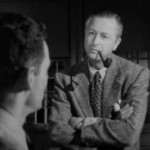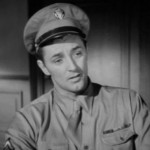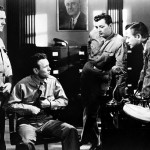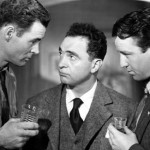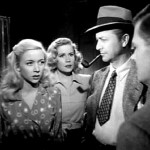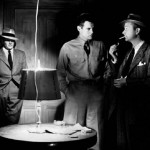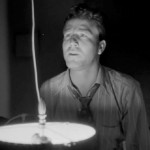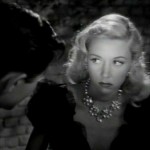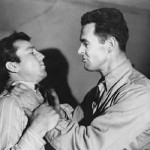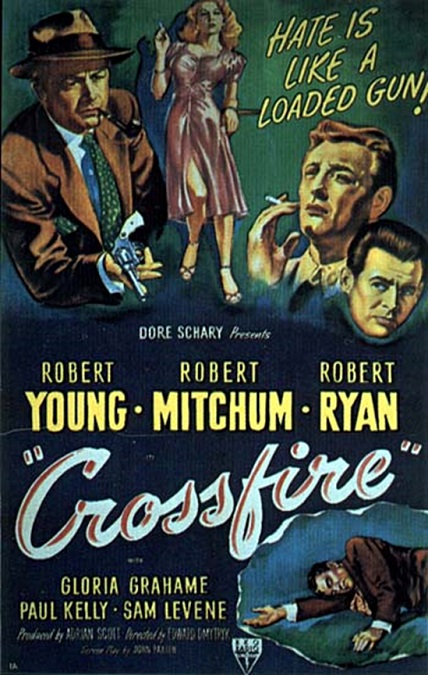
Crossfire – 1947
Crossfire was a murder mystery… sort of. It didn’t take much figuring to understand who-done-it. But then, what was the conflict, you might ask. The conflict was: would the police arrest the right guy? Also: what was his motive?
First, let’s examine the characters. The film starred three Roberts. There was Robert Mitchum, Robert Young, and Robert Ryan. Along with them there was Gloria Grahame, George Cooper, Jaqueline White, Steve Brody, and lest we forget, the murder victim, himself, Sam Levene. We’ll start there. Leven played Joseph Samuels. All you need to know about him was that he was Jewish. Robert Young was Police Captain Finlay, the man trying to solve the murder. The rest of the men were all soldiers, recently come home after the war. That leaves Grahame, a dance hall floosy, and White, Cooper’s wife.
Robert Mitchum played Sgt. Keeley, all around good guy and hero. George Cooper had the role of Corporal Mitchell, the prime murder suspect for half the film. Robert Ryan played the anti-Semitic Montgomery, and Steve Brody played his idiot friend, Floyd Bowers.
The plot is simple and can be summed up pretty quickly. Samuels is murdered and all evidence points to Corporal Mitchell. After all, he was so drunk at the time of the crime, he couldn’t remember what he had really done. But the police can’t find him. Sgt. Keeley, Mitchell’s best friend tries to defend him and finds him before the police do. It becomes evident, before the film is even half over, that Montgomery did it, though his motives aren’t clear. Eventually, Keeley, convinced that Mitchell is innocent, tells the cops where to find him. By then, Captain Finlay knows it wasn’t him. With the help of another army officer, Leroy, played by William Phipps, they trick Montgomery into giving himself away. He tries to run and gets gunned down. The end.
If it were me, I’d have kept it as a true who-done-it for as long as I could. I’d have misled the audience at every opportunity. But it seems that wasn’t the point of the film. The real point was hitting the viewers over the head with anti-Semitism. It all starts with fear of anything different than ourselves. That naturally leads to hate. Hate leads to acts of discrimination. Discrimination leads to violence. Violence leads to murder. We have to stop the hate!
The argument was really driven home in a speech by Captain Finlay, as he is trying to convince Leroy to help them trap Montgomery. He said, “This business about hating Jews comes in a lot of different sizes. There’s the ‘you can’t join our country club’ kind. The ‘you can’t live around here’ kind. The ‘you can’t work here’ kind. Because we stand for all these, we get Monty’s kind. He grows out of all the rest… Hating is always insane, always senseless.” In that speech was the real point of the film.
He went on to say, “My grandfather was killed just because he was an Irish Catholic. Hating is always the same, always senseless. One day it kills Irish Catholics, the next day Jews, the next day Protestants, the next day Quakers. It’s hard to stop. It can end up killing people who wear striped neckties.” Do you see how dangerous hate is? Did you hear that, audience?
The performances were not bad, but not particularly good, either. The music didn’t stand out as anything special. The sets and costumes were all appropriate. There just wasn’t much about the film that stood out to me as above average
I guess that I just didn’t really get what I wanted. I was all set up to see a murder mystery, and it had a bit of potential at the beginning. But it fell flat as soon as it became clear who the real murderer was. A better film would have kept me guessing longer or at the very least, made the evidence against the wrong suspect stronger, making me doubt what I was being told. But no. All the film makers really wanted to do was to say their piece about anti-Semitism.
One of the performances I liked was that of Gloria Grahame. She actually had a little bit of bitter drama about how much she hated her life as a dance hall girl. She kept trying to say that there was nothing wrong with what she did. She protested a bit too much, though, making me think that she was the one who hated it. Her part was small, but she did a good job.
An interesting little thing I discovered about the film is that in the original novel upon which the movie is based, the issue was not anti-Semitism, but homophobia. Apparently, the character of Samuels was gay, and that was why he was murdered. But that pesky Hayes Code considered homosexuality to be a sexual perversion and would not allow any mention of it on the big screen. So it was changed to a racial issue… stupid Hayes Code.
